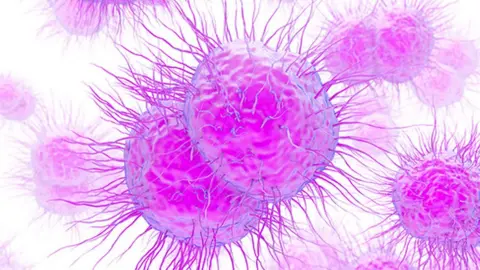Surge in gonorrhoea cases recorded across Scotland
 Getty Images
Getty ImagesThe number of cases of gonorrhoea recorded in Scotland has soared since the end of Covid lockdown restrictions.
New figures from Public Health Scotland (PHS) show there were 5,641 diagnoses of the sexually transmitted infection last year, a 49% increase on 2019.
The end of social distancing restrictions and more people being checked at sexual health clinics is partly to blame for the rise.
The majority of those diagnosed with the disease were younger men.
Rates of the infection have increased rapidly since May 2021, from three positive diagnoses per 100,000 people to a "historical high" of 17.2 per 100,000 in November 2022.
In its report PHS describes the increase as "concerning" and suggests it may "reflect both recovery of testing and diagnosis of infection which was undiagnosed during the Covid pandemic and an increase in incident infection which may be, in part, a consequence of transmission from undiagnosed individuals".
The increase is not linked to increasing resistance to antibiotic treatment, said PHS which also warns that dealing with the surge in cases will be "challenging" due to reduced capacity at sexual health clinics across Scotland.
The health quango said it may require targeted testing of "higher risk, symptomatic individuals".
Gonorrhoea cases dropped in 2020 when the number of people being tested fell dramatically as result of the Covid pandemic.
The low numbers of cases in 2021 was partly attributed to social distancing measures in place in that year.
In 2022, three NHS Boards (NHS Greater Glasgow and Clyde, Lothian and Grampian) reported 63% of all gonorrhoea diagnoses.

What is gonorrhoea?
 SPL
SPLThe disease is caused by the bacterium Neisseria gonorrhoeae.
The infection is spread by unprotected vaginal, oral and anal sex.
Symptoms can include a thick green or yellow discharge from sexual organs, pain when urinating and bleeding between periods.
However, vaginal and rectal infections often have no symptoms.
An untreated infection can lead to infertility, pelvic inflammatory disease and can be passed on to a child during pregnancy.

